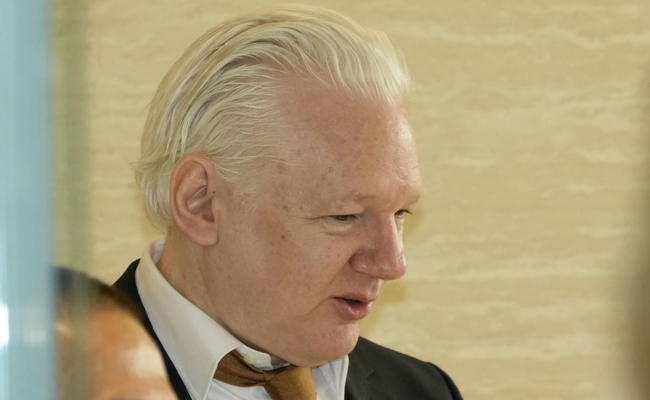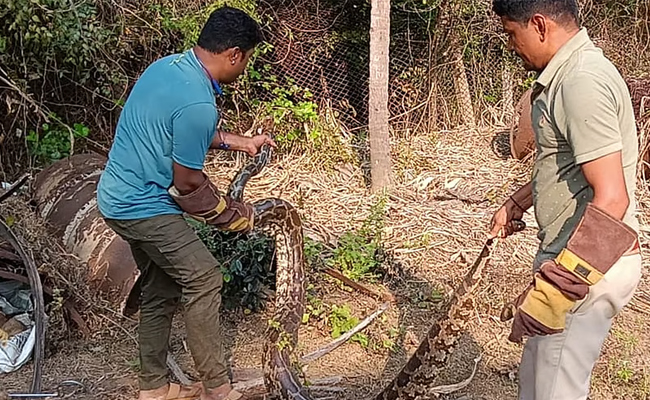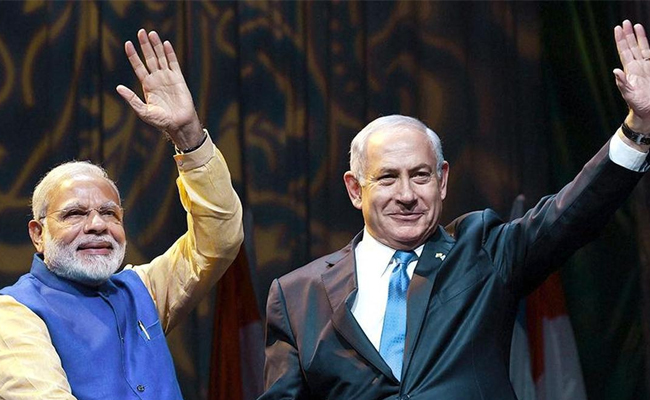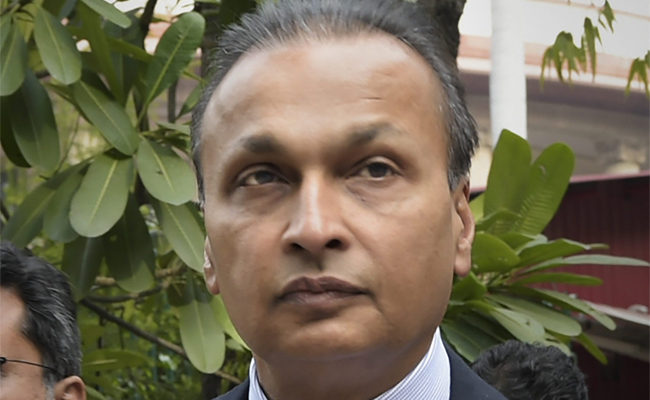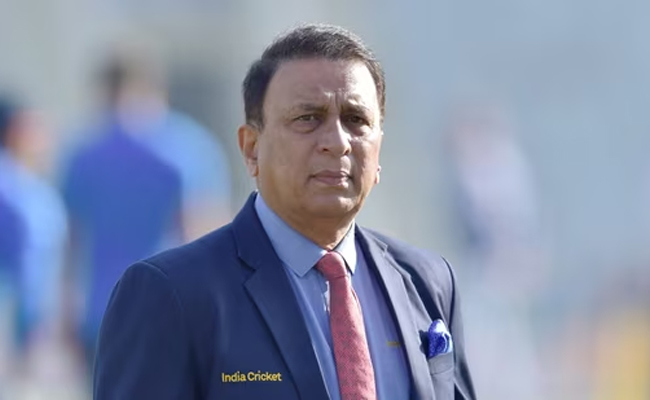Canberra (AP): WikiLeaks founder Julian Assange returned to his homeland Australia aboard a charter jet on Wednesday, hours after pleading guilty to obtaining and publishing US military secrets in a deal with Justice Department prosecutors that concludes a drawn-out legal saga.
The criminal case of international intrigue, which had played out for years, came to a surprise end in a most unusual setting with Assange, 52, entering his plea in a US district court in Saipan, the capital of the Northern Mariana Islands. The American commonwealth in the Pacific is relatively close to Assange's native Australia and accommodated his desire to avoid entering the continental United States.
Assange had flown from a London prison to Saipan in a charter jet and flew in the same aircraft to the Australian capital Canberra on the same day.
He was accompanied on the flights by Australian Ambassador to the United States Kevin Rudd and High Commissioner to the United Kingdom Stephen Smith, both of whom played key roles in negotiating his freedom with London and Washington.
The flights were paid for by the “Assange team,” Deputy Prime Minister Richard Marles said, adding his government played a role in facilitating the transport.
Prime Minister Anthony Albanese told Parliament that Assange's freedom, after he spent five years in a British prison fighting extradition to the US, was the result of his government's “careful, patient and determined work.”
“Over the two years since we took office, my government has engaged and advocated including at leader-level to resolve this. We have used all appropriate channels," Albanese said.
Assange's lawyer Jennifer Robinson, speaking outside the Saipan court, thanked Albanese “for his statesmanship, his principled leadership and his diplomacy, which made this outcome possible.”
It is unclear where Assange will go from Canberra and what his future plans are. His South African lawyer wife and mother of his two children, Stella Assange, has been in Australia for days awaiting her husband's release.
Another of Julian Assange's lawyers, Barry Pollack, expected his client would continue vocal campaigning.
“WikiLeaks's work will continue and Mr. Assange, I have no doubt, will be a continuing force for freedom of speech and transparency in government,” Pollack told reporters outside the Saipan court.
Assange's father John Shipton said ahead of his son's arrival that he hoped the iconoclastic internet publisher was coming home to the “great beauty of ordinary life.”
“He will be able to spend quality time with his wife, Stella, and his two children, be able to walk up and down the beach and feel the sand through his toes in winter, that lovely chill,” Shipton told Australian Broadcasting Corp.
The plea deal required Assange to admit guilt to a single felony count but also permitted him to return to Australia without any time in an American prison. The judge sentenced him to the five years he'd already spent behind bars in the UK fighting extradition to the US on an Espionage Act indictment that could have carried a lengthy prison sentence in the event of a conviction. He was holed up for seven years before that in the Ecuadorian Embassy in London.
The conclusion enables both sides to claim a degree of satisfaction.
The Justice Department, facing a defendant who had already served substantial jail time, was able to resolve — without trial — a case that raised thorny legal issues and that might never have reached a jury at all given the plodding pace of the extradition process.
Assange, for his part, signalled a begrudging contentment with the resolution, saying in court that though he believed the Espionage Act contradicted the First Amendment, he accepted the consequences of soliciting classified information from sources for publication.
The plea deal, disclosed Monday night in a sparsely detailed Justice Department letter, represents the latest — and presumably final — chapter in a court fight involving the eccentric Australian computer expert who has been celebrated by supporters as a transparency crusader but lambasted by national security hawks who insist that his conduct put lives at risks and strayed far beyond the bounds of traditional journalism duties.
The criminal case brought by the Trump administration Justice Department centres on the receipt and publication of hundreds of thousands of war logs and diplomatic cables that included details of US military wrongdoing in Iraq and Afghanistan.
Prosecutors alleged that he teamed with former Army intelligence analyst Chelsea Manning to obtain the records, including by conspiring to crack a Defence Department computer password, and published them without regard to American national security. Names of human sources who provided information to US forces in Iraq and Afghanistan were among the details exposed, prosecutors have said.
But his activities drew an outpouring of support from press freedom advocates, who heralded his role in bringing to light military conduct that might otherwise have been concealed from view and warned of a chilling effect on journalists.
Among the files published by WikiLeaks was a video of a 2007 Apache helicopter attack by American forces in Baghdad that killed 11 people, including two Reuters journalists.
The indictment was unsealed in 2019, but Assange's legal woes long predated the criminal case and continued well past it.
Weeks after the release of the largest document cache in 2010, a Swedish prosecutor issued an arrest warrant for Assange based on one woman's allegation of rape and another's allegation of molestation. Assange has long maintained his innocence, and the investigation was later dropped.
He presented himself in 2012 to the Ecuadorian Embassy in London, where he claimed asylum on the grounds of political persecution, and spent the following seven years in self-exile there, welcoming a parade of celebrity visitors and making periodic appearances from the building's balcony to address supporters.
In 2019, his hosts revoked his asylum, allowing British police to arrest him. He remained locked up for the last five years while the Justice Department sought to extradite him, in a process that encountered scepticism from British judges who worried about how Assange would be treated by the US.
Ultimately, though, the resolution sparing Assange prison time in the US contradicts years of ominous warnings by Assange and his supporters that the American criminal justice system would expose him to unduly harsh treatment, including potentially the death penalty — something prosecutors never sought.
Last month, Assange won the right to appeal an extradition order after his lawyers argued that the US government provided “blatantly inadequate” assurances that he would have the same free speech protections as an American citizen if extradited from Britain.
His wife, Stella Assange, told the BBC from Australia that it had been “touch and go” over 72 hours whether the deal would go ahead but she felt “elated” at the news.
Assange on Monday had left the London prison where he has spent the last five years after being granted bail during a secret hearing last week.
Let the Truth be known. If you read VB and like VB, please be a VB Supporter and Help us deliver the Truth to one and all.
Karwar: Six pythons were rescued from a residential premises in Katinakona area of Karwar on Sunday, causing panic among local residents.
The pythons were found amid construction material stocked on the house premises. Forest officials were alerted, following which Forest Guard Gopal Naika reached the spot and safely rescued the reptiles.
According to a report published by Deccan Herald, Naika said the pythons measured between 8 and 12 feet in length. All of them were later released into the forest.
“Initial days of summer is the mating season for snakes. It is natural for males of the species to come in search of females for mating. Hence, they are found in large number in one location,” Naika said.

